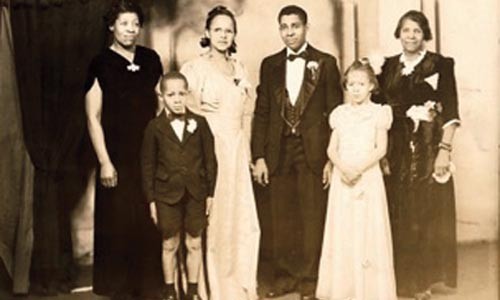Shadyside resident Joe Kennedy IV has at least one thing in common with Alex Haley: Both spent 10 years tracing their African-American genealogy to their roots.
Do they share anything else -- like, say, a common ancestor? Too soon to tell.
Haley, of course, is known for the landmark book and TV miniseries, Roots, which were based on his in-depth examination of six generations of black heritage. Kennedy has taken his passion for the past and used it to create Riverbends Inc. The not-for-profit online project helps others -- especially African Americans -- trace their family origins, primarily by using online resources.
Doing so "helps build a sense of interconnectedness," says Kennedy, 42. "When you dig back, you come to an understanding of the fact that we're all related to one another. It's just a matter of knowing how far back you have to go to find a common relative."
After spending a decade seeking out his own background, Kennedy created the online organization (www.riverbends.org) to help others do the same. Earlier in June, the Buhl Foundation awarded him a $30,800 grant to help support his work. Those funds, Kennedy says, will fund a one-year pilot program of a Family History Program in three of the Beverly Jewel Wallace Lovelace after-school centers.
Kennedy has designed his website as a resource for the "do-it-yourself genealogist." It provides tips and strategies on tracing family history, navigating records and digitizing the information. It also includes galleries from others who have traced their ancestry as well as a breakdown of Kennedy's own research. "People don't need a degree from Harvard to look into their family history," Kennedy says. "Using the Internet, you can capture the research."
African Americans face particular challenges in tracing their history, Kennedy observes. Though historically, free African Americans in the North and South were listed by name in the federal census, Kennedy notes that slaves were simply listed on slave schedules, usually without names, up to the 1850 and 1860 censuses. After slavery ended, and beginning with the 1870 census, African Americans were identified with full names.
Documents on ancestors' enslavement, or freedom for that matter, can be hard to find. Being able to pinpoint that history overrides, somewhat, any pain or mixed feeling about that part of American history, Kennedy says. "I think it's a story worth saving and sharing."
Kennedy, who has a law degree from Cornell, has developed his research skills and online savvy to sift through records to establish his past. He has documented the photos, wedding announcements, slave sale records and a trove of other documents online. Riverbends offers free step-by-step instructions online for navigating such documents.
Kimberly Ellis, executive director of the Historic Hill Institute in the Hill District, notes that because blacks have struggled to exist in a society "that did not even consider black people to be human beings during the period of enslavement," research can be difficult. For instance, names may or may not be found on property records which recorded slave ownership. Post-slavery records also pose a challenge, Ellis says, because once married, blacks often changed their names and traveled around the country to reconnect with family from whom they had been forcibly separated.
But the results are worthy of the effort, adds Ellis. Tracing back one's heritage can "reaffirm the spiritual substance of our resilience, which was to affirm our humanity in the midst of inhumanity," she says. "Every namesake, marriage license, work product, invention, voyage, home ownership, government position, census enumeration and tie to land, language and culture reaffirms this fact and strengthens us as individuals, families. [It is] the narrative of a nation and the journey of an African people once considered lost but [which] is finding new ways to find itself every day."
Kennedy's own genealogy, for example, contains numerous surprises. His family had no idea his great-great-grandfather was a Civil War veteran, a restaurateur and a well-known man around Wilkes-Barre in the late 1800s. Armed with his savvy for navigating court records and newspaper archives, Kennedy was able to go from only a relative's name to tracking down both a marriage certificate and a document detailing his death in 1890. That find led to another piece of Kennedy's heritage puzzle, and it didn't stop there.
His lineage, so far, has been traced back to 1726 and includes 2,500 people. Since he started his research, Kennedy has identified 76 ancestors across Pennsylvania, Virginia and North Carolina which is "very unusual in African-American genealogy," he says.
"I have an extremely rich and nuanced family history: northern and southern, black and white, rich and poor, slave and free," he says. "I think among them, the lives they lived and the experiences they went through tell a side of American history most people would be interested in."
Such discoveries have led Kennedy's family to relatives they never knew they had, like a 95-year-old cousin who lived less than 90 minutes away.
"While history as we know it seems not to be a favorite subject [in school], I'm excited for children to learn about this," observes Theressa Turner, Kennedy's 61-year-old aunt.
"It's like a mystery or suspense novel," notes a cousin, Yvette Harris, from New Jersey. "Joe's providing the pages for us to read and uncover our history."















